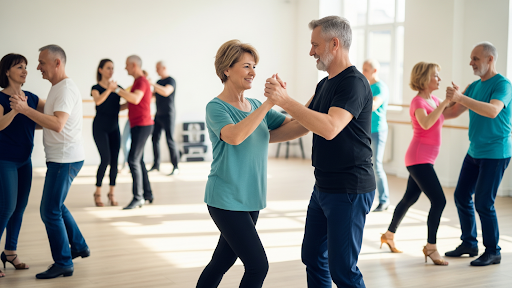How Long Does It Take to Learn Salsa? Timelines & Tips
Posted on - 12 September 2025

Starting from scratch? You’ll learn the basic salsa steps in your very first class!
That means you’ll already be moving with music and dancing with a partner on day one.
It’ll take you about 6-12 months of consistent practice to get comfortable enough to dance through full songs at socials.
Why is there a range?
Because it depends on things like:
How often you practice(once a week vs. three times a week makes more of a difference than you’d believe)
Whether you go out social dancing(dancing with multiple partners speeds things up)
Your background in dance or music(not a requirement, but it sure does help!)
However, you don’t need to wait to enjoy it! Salsa feels rewarding right away.
Every class gives you new moves, new music, and new confidence.
What You’ll Learn in This Blog
By the time you finish reading, you’ll know:
How long it usually takes to learn salsa, from your first steps to confident dancing
Why salsa isn’t as hard as it looks (and what really makes it click)
The stages of salsa progress, from newbie to artist
How to speed up your learning with simple daily habits
The main salsa styles and what makes each unique
Salsa gear and prep tips nobody tells beginners
The most common mistakes and how to avoid them
Why age is never a barrier to learning salsa
Is Salsa Hard to Learn?
Not really.
There is an 8-beat pattern that is repeating. You’ll learn it pretty quickly, and it helps that there are a lot of salsa dance moves for complete beginners.
It looks flashy, but the core rhythm is simple: 1-2-3, 5-6-7.
Now, the challenge isn’t the step itself, but things like staying on time with the music, relaxing your shoulders and letting your body move, and learning to connect with different partners.
So, relax because it’s less about difficulty and more about practice and patience.
How Long Does It Usually Take to Get Good at Salsa?
Let’s break down the entire journey.
Months 1 & 2: The Newbie Stage
During this time, you’ll learn the basic steps, catch the rhythm, and lead/follow simple turns.
You’ll also probably overthink it, but that’s completely normal!
Months 3 to 6: The Social Stage
Here, you’ll be able to dance through a full song without stopping, stay on beat more often, and going out to socials will feel less scary and way more fun.
Months 6 through 12: The Confident stage
You begin adding shines (solo footwork) and other flares and styling to your dance. You can also dance with different partners comfortably.
You’ll also start feeling the music instead of just counting the beats.
1 to 4 Years: The Artist Stage
In this stage, your technique gets sharper, and you explore musicality and your own style. Some dancers even start performing or teaching.
Can You Learn Salsa Without a Partner?
Yes, to a point.
Solo practice helps a lot with basic step timings, shines, balance, and body movement.
However, since salsa is a partner dance, the improvement really kicks in once you start dancing socially. Practicing with different partners teaches adaptability, leading and following skills, and confidence.
How To Learn Salsa Dance Faster
Nobody wants to spend years fumbling around on the dance floor and stepping on toes.
A few habits make a huge difference!
Take classes consistently- atleast once a week. Twice is even better
Dance socially- this is where your confidence really grows
Practice at home- even 10 minutes helps lock the basics in
Listen to salsa music- this will help your ear to catch the rhythm naturally
Dance with different partners- it teaches adaptability and connection
Salsa Styles: Which One Are You Learning?
Now don’t be fooled, because not all salsa is the same!
Knowing which style you’re learning helps set realistic expectations:
Salsa on1 (LA Style):This is the most common salsa style in the U.S. It is fast, energetic, and beginner-friendly.
Salsa on2 (New York Style):This style is danced slightly differently to the music, often considered smoother and more musical.
Cuban/Casino:There is a presence of circular patterns with more body movement and Afro-Cuban influence.
Colombian (Cali Style):This style is characterized by very fast foodwork and is danced to quicker music.
Depending on the style you’ve chosen, your learning curve may feel faster or slower.
Salsa Gear & Prep (Things That Nobody Tells You)
A few little tweaks here and there can make your learning experience so much easier:
Shoes matter.Sneakers stick to the floor. Lightweight dance shoes (or at least smooth-soled shoes) help you turn without strain.
Clothing counts.Comfortable, breathable fabrics keep you relaxed.
Hydration helps.Socials can run for hours; make sure you have water on hand.
Mindset is key.Salsa is about fun, not perfection. Nobody’s watching as closely as you think.
Common Beginner Mistakes in Salsa
| Mistake | Why It Happens | How to Fix It |
| Dancing off-time | New dancers focus on moves instead of music | Clap or count along to the beat, listen to salsa music daily |
| Looking at your feet | Lack of confidence in steps | Keep your head up, trust muscle memory, and focus on your partner |
| Overleading or resisting | Trying too hard to control or predict | Connection should feel light — think of “guiding,” not pushing or pulling |
| Avoiding socials | Feeling shy or “not ready yet” | Remember, socials are where the real progress happens. Everyone was a beginner once! |
Am I Too Old to Learn Salsa?
Never!
From teens to dancers in their 70s and beyond, salsa is a great beginner dance, enjoyed by people of all ages.
If you’re in your 30s, 40s, or above and you’re just starting out or thinking about it, you’re not alone!
Quit procrastinating and don’t let hesitation keep you from looking up “salsa classes near me” and enrolling yourself as soon as possible!
Salsa becomes a source of lifelong fitness, joy, and friendship!
The Final Beat: Why Now Is the Perfect Time
Learning salsa isn’t just about steps and timing.
It’s about stepping into a community, discovering confidence you didn’t know you had, and finding joy in every beat. Whether it takes you six months or a few years to feel like a natural, the real win is that you’ll be having fun from day one.
Don’t wait until you “feel ready”; instead, let your first class be the leap.
Start with the basics, keep the “Key Points To Prepare for Your First Salsa Class” in mind, and trust that every stumble brings you closer to flow.
The music is waiting, your partners are ready, and the dance floor has a spot with your name on it.
Go take it.
 RF Dance
RF Dance